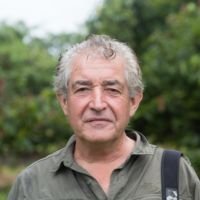
This is the best climate solution I’ve come across yet
Just last week, the world received yet another wake-up call when it was revealed that the pace of forest loss globally accelerated again. Up to the equivalent area of eighteen football fields a minute, from 10 a minute in 2023, marking a huge 80% increase, mostly due to wildfires.
It is another sign that the world’s rainforests are struggling to adapt to a hotter climate, and, if this continues, they won’t be able to regulate it as they’ve done for millions of years. The consequences for climatic stability, water security, biodiversity, livelihoods and the health of millions of people are already being felt. What has changed in recent months is a pace of change never before seen, with outcomes nobody wishes to imagine.
Protecting and restoring rainforests to mitigate climate change and keep humanity safe isn’t new. Billions of dollars have been spent over the last decades to address it, with billions more pledged to accelerate the fight. Yet, so far we’ve been unable to turn the tide.
There is, however, a simple solution to get us on the front foot: no-strings cash payments to Indigenous peoples and local communities that live in rainforest.
It’s cheap. It’s quick. It’s impactful. And it’s proven.
Almost 50% of all rainforests are inhabited by Indigenous peoples and local communities, on lands that hold a large proportion of the carbon locked up in vegetation (and thus out of the atmosphere), while harbouring much of the Earth’s biological diversity. On average, their territories show 2.5 times lower deforestation rates than any other lands, including protected areas.
They steward areas that generate over US$1 trillion in ecosystem services annually. More often than not, however, the mechanisms in place to support and reward them - like carbon and nature markets - fail to deliver the resources and safeguards they need to resist the threats to their lands from logging, mining, agriculture, wildfire and drought.
As we face the global climate and nature crisis, it would be unwise to regard the contribution of Indigenous people and local communities as a sideshow to the main event of technology and ecosystem markets. The truth is that it is these people who hold the best track-record of rainforest protection and one of the most cost-effective steps we can take is to back them. World leaders and governments have for decades highlighted the importance of Indigenous and other forest communities, but the time for deliberation on how best to support them has run out. Now is the moment to take decisive action.
The UK could play a leading role, through diverting just 1%, approximately £115 million, of its International Climate Finance (ICF) directly to people who live in rainforests. It is money that is already pledged as part of the global effort to provide $100 billion per year to low-income countries to help safeguard them against the impact of climate change and would ensure these precious resources get to those who are having the greatest impact, and in the most direct and effective way.
Despite recent cuts to the UK’s aid budget, money is still earmarked for the fight against deforestation and climate change, and this would be a very cost-effective way of using those resources.
Investments in carbon capture and storage, clean power, and the development of high-integrity carbon markets are necessary, but will deliver benefits in the future and at a greater cost. If we effectively leveraged a small proportion of the Official Development Assistance (ODA) destined to tackling climate change towards providing unconditional cash payments to those in the rainforest instead, it would benefit people and the planet immediately.
I’ve worked to conserve the rainforests since the 1980s, most recently as Chair of Cool Earth, I’ve witnessed the power of giving cash to communities that live in rainforests. It provides them with the autonomy to adapt their practices, maintain their knowledge systems and access new technologies to enable them to ensure the forests they look after stay intact. Giving them just 1% of the UK’s climate finance is a lifeline for our entire planet and a guarantee for future generations.
So, as the world prepares for COP30, hosted in the Amazon rainforest of Brazil this November, I urge the UK government to act as the flag bearer of this approach. In these unprecedented times, it is an opportunity for Britain to reassert its vital global leadership on climate action.

Tony Juniper is one of Britain’s best-known environmental campaigners.
Chair of global rainforest charity Cool Earth, Tony has worked on efforts to conserve tropical forests around the world for nearly 30 years. He has held roles including Director of Friends of the Earth, special advisor to His Majesty The King’s Rainforests Project and Director for Advocacy and Campaigns at WWF. Tony’s experience on the frontline fight to save the world’s most precious trees, plants and animals has inspired many to do the same.
His current role as Chair of Natural England means Tony balances preserving and rewilding UK’s nature with championing Earth’s rainforests and raising awareness on the importance of taking genuine environmental action.














